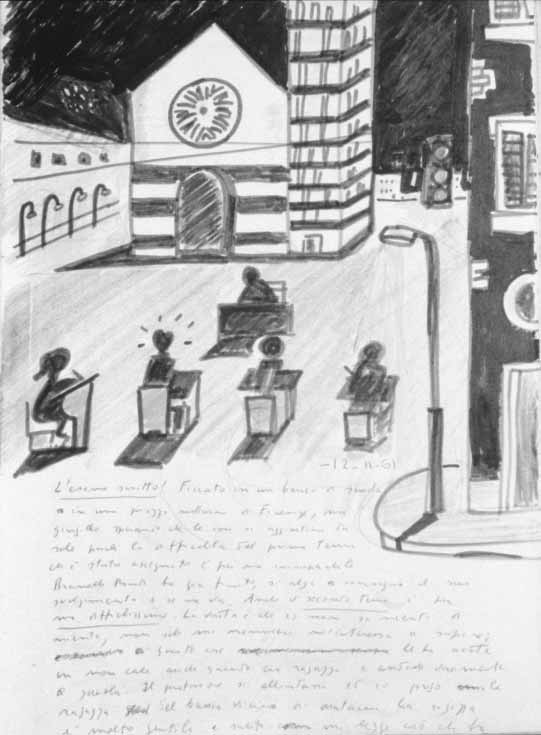
A harried movie director retreats into his memories and fantasies.
EN
“Anyone who deserves to be called an artist should be asked to make this single act of faith: to educate oneself to silence. Do you remember Mallarmé’s praise of the white page? And Rimbaud, a poet, my friend, not a movie director. Do you know what his finest poetry was? His refusal to continue writing and his departure for Africa. True perfection is in nothingness. What a monstrous presumption to think that others might enjoy the squalid catalogue of your mistakes! And what good would it do you to string together the tattered pieces of your life, your vague memories, or the faces of the people that you were never able to love?”
Daumier
“Few people knew that since autumn 1960 the director had been thinking about the outline of an ambitious new film [which was to become 8 ½]. He began to toy with the idea after a visit to Ischia, where had contemplated human beings half-buried in the radioactive mud of the Lacco Ameno baths belonging to Angelo Rizzoli, his producer. He wanted to portray different aspects of a man whose life was meaningless and who was attempting to come to grips with his problems at a fashionable bathing station.”
Angelo Solmi1
“During the entire process of filming 81⁄2, Fellini pasted a note to himself on his camera as a pro memoria: ‘Remember that this is a comic film.’”
Peter Bondanella2
“After La dolce vita, however, Fellini turns toward the expression of a personal fantasy world that often, as in the case of 81⁄2, also deals with the representation of cinema itself in a self-reflexive fashion. This turn toward a world more directly taken from his own fantasy owes a great debt to his encounter with Jungian psychoanalysis, which Fellini described as ‘like the sight of unknown landscapes, like the discovery of a new way of looking at life.’ Fellini had always had a predilection for the irrational, had always experienced a very rich dream life, and under the influence of Jungian psychoanalysis and his encounter with a Roman analyst named Ernest Bernhard, Fellini began to record his numerous dreams, filling large notebooks with colorful sketches made with felt-tip markers that would become a source of inspiration for his art. Fellini preferred Jung to Freud because Jungian psychoanalysis defined the dream not as a symptom of a disease that required a cure but rather as a link to archetypal images shared by all of humanity.”
Peter Bondanella3
“Today I still need this feeling of being a guest in my invented dream world, a welcome guest in this dimension which I myself am able to program. What I need to maintain, however, is a feeling of curious surprise, a feeling of being a visitor, after all, an outsider, even when I am, at the same time, the mayor, the chief of police, and the alien registration office of this whole invented world, of this city that I have been led to by the shiny reflection in the faraway window and which I know so well in all its details that I can finally believe that I am in my own dream! After all, it’s the dreamer who has made the dream. Nothing is so intrinsically true and corresponds so deeply to the psychic reality of the dreamer as the dream itself. Nothing is more honest than a dream.”
Federico Fellini4
- 1Angelo Solmi, Fellini (London: Merlin Press, 1967), 164. Translated to English by Elizabeth Greenwood.
- 2Peter Bondanella, The Films of Federico Fellini (London: Cambridge University Press, 2002), 100.
- 3Peter Bondanella, The Films of Federico Fellini (London: Cambridge University Press, 2002), 93.
- 4Gideon Bachmann, “A Guest in My Own Dreams: An Interview with Federico
Fellini,” Film Quarterly 47, no. 3 (1994): 7.


